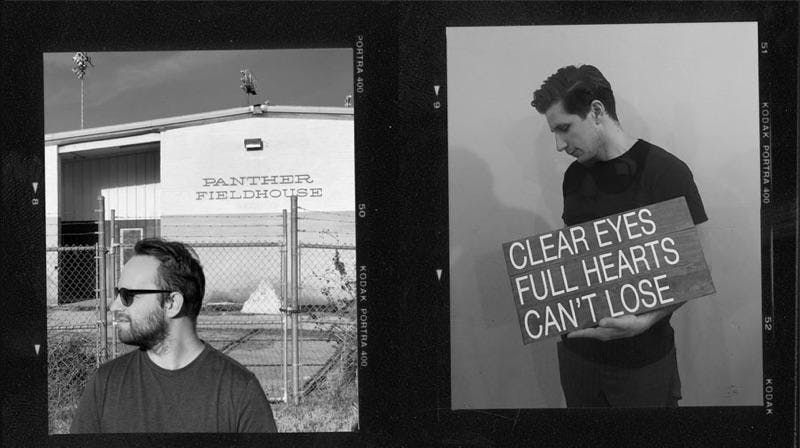Coming Up For Air
Going off track a little bit, how true to the book – to the real life story – is the series?
Soupy: So, the book is a true account of a Philadelphia sports writer who moved to West Texas, Odessa, to experience a season at Permian High School there, and it’s a journalistic account about that. Then the movie is a semi-hyperbolised account of the book, like the Hollywood version of the book, and then the TV show is like a fictionalised version of the movie. So it takes some of the tenets and themes of the movie, but the characters are not the same characters and the town is not the same town. But the idea is the same – let’s explore the complexities of something that’s supposed to be simple. It’s Texas high school football, but it’s so much more than that and the show is entirely its own thing with its own story arc, but it shares that core.
When did you write these songs? You did you do so completely separately?
Ace: Yeah. I think I started mapping out the music a month or so ago, but I did the bulk of the writing two weeks ago.
Soupy: I’ve been doing it a little longer. I kept talking to people about how badly I wanted to do it, so they were all like, ‘So why aren’t you doing it?’ And it was hard to get it started, but then I thought if I just wrote a song and sent it to everybody, then they’d know it was real and then we should get started on the project. So I wrote QB 1 in May and June, and I wrote Coming Up For Air in July and I wrote On Tim Riggins... in October, and I tracked them all in a hotel room in Iowa on a day off on the last Wonder Years with Nick from The Wonder Years, who produced it for me.
Given that you wrote entirely separately, were you surprised at how cohesive the two sets of songs sound together?
Soupy: I was definitely pleasantly surprised by it. But the thing is that Ace is such an unbelievably talented songwriter – I know that from doing all the Aaron West stuff with him – so I knew he was going to bring something amazing.
Ace: You’re making my heart sing right now!
Soupy: It’s kind of uncanny. He just sees it on a different level than I think a lot of other people see it.
Ace: I feel the same way. It’s a true pleasure. Everything came up awesome and I couldn’t be happier with it. When you told me you did your songs I was like, ‘I better do my songs!’ For a long time, I wasn’t actually sure if it was going to be a real thing or not and it was very cool to see it become a reality.
How removed from your regular projects did this feel? Was it more challenging?
Ace: I think it was easier if anything, because you have no boundaries. You could say things ape talk in ways that you normally can’t and express the emotion or whatever you’re trying to convey in a completely free way. And for me, it makes it way easier because there are no rules and you can just truly be artistic and creative with it. I really enjoyed it. It was just fun.
Soupy: Ace, I think the phrase for what you’re describing is the weight of expectation. I didn’t have the weight of expectation on me for this. No-one is saying it doesn’t sound like the last one or isn’t as good. There’s nothing to compare it to – we were just free to do it. The hardest part for me was just getting started. This was the first time I’d decided to write a song about fictional source material that already existed. With The Wonder Years stuff I’m writing about my life and with Aaron West I’m writing the fiction that becomes the source material for the songs. But this was taking someone else’s source and exploring it in a different way and it was just a matter of figuring out how do that – and once it started it just poured out.
